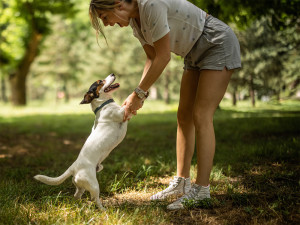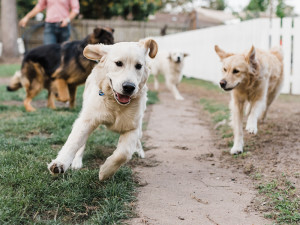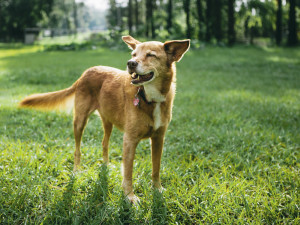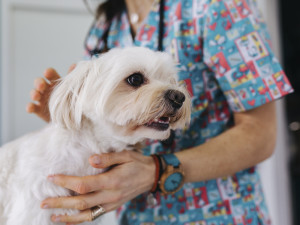Diagnosing Kennel Cough in Dogs: A Comprehensive Guide
When to call the vet.
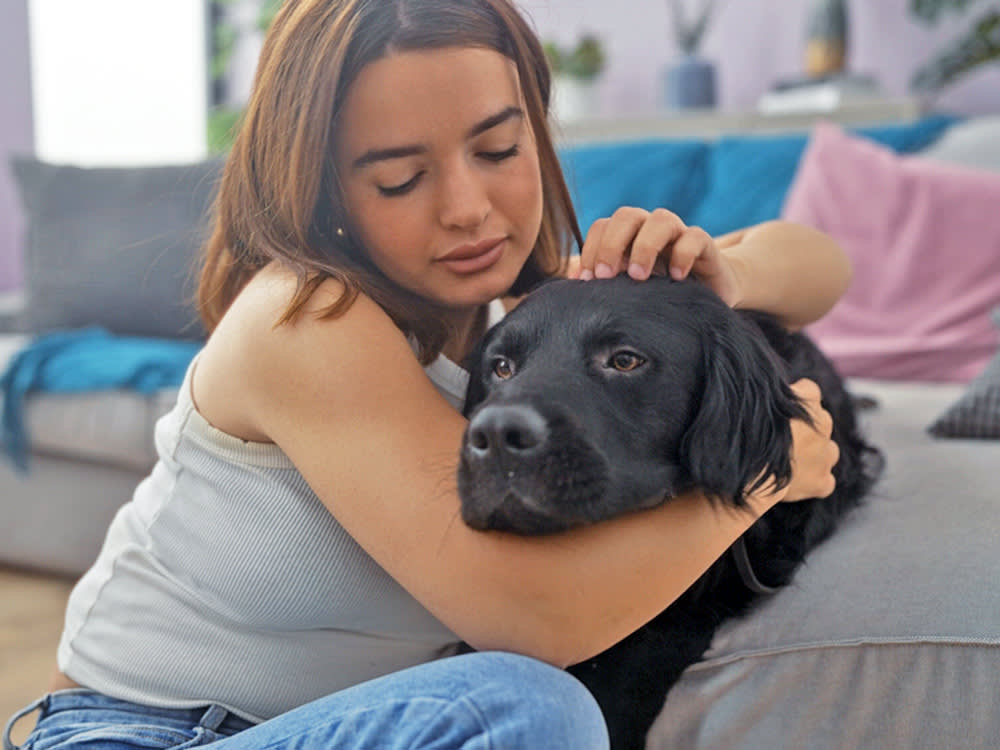
Share Article
In This Article:
How to Identify Kennel Cough Common Misconceptions Common Symptoms Exposure Risks How Contagious Is Kennel Cough How Vets Diagnose Kennel Cough
It’s easy for pet parents to become complacent and think that their dog is completely safe from kennel cough. After all, their dog is vaccinated and only sees other healthy dogs. Surprisingly, the bacteria and viruses that can cause kennel cough can be spread by dogs without symptoms. Almost half of asymptomatic dogs in animal shelters were shown to carry at least one of the bugs that can cause kennel cough, and about one in nine healthy dogs in long-term homes can spread the disease.
Is my dog’s cough serious?
It often starts with a simple gag or retch, maybe once or twice during playtime. Then, as everyone’s trying to settle down to sleep, it becomes a frequent hacking, gagging cough that sounds miserable and leaves you wondering, “What’s causing my dog to hack and cough like this? Does my dog have something caught in his throat? Should I go to the emergency vet to get this cough checked out?”
In many veterinary ERs, things tend to settle down around 3 or 4 a.m., giving us time to catch up on records, eat some food, and check on hospitalized patients. In my experience, phone calls at this time of the morning tend to fall into one of two categories: “My pet is having a catastrophic emergency” or “My pet is doing something that is preventing everyone from sleeping.”
Kennel cough usually falls into the second category. Although the sounds coming from dogs with kennel cough can be very dramatic, the disease is rarely life threatening. Still, it’s understandable that pet parents want to get that cough under control quickly so they and their dog can get some rest. No matter the time of day or night, getting a dog’s cough checked out early is never wrong because some causes of cough can be serious.

How to identify kennel cough
Veterinarians usually diagnose kennel cough based on symptoms and history alone. The hallmark signs of kennel cough include a hacking cough and a recent history of boarding or contact with other dogs. There are tests available to identify the specific virus or bacteria causing the cough, but in most uncomplicated cases, they are unnecessary because the treatment is the same.
Definition and medical terminology
Most dog parents are familiar with the term “kennel cough,” but the disease name has evolved with time as its causes are better understood. This contagious cough of dogs has also been known as infectious tracheobronchitis and canine upper respiratory complex but is now called canine infectious respiratory disease (CIRD). CIRD encompasses many of the most common causes of acute upper respiratory tract infections in dogs.
Common causative agents
Kennel cough is most commonly caused by infection with one or more of these pathogens:
Bordetella bronchiseptica
Canine parainfluenza virus
Canine respiratory coronavirus
Mycoplasma spp.
Canine adenovirus type 2
Canine pneumovirus
Streptococcus equi subspecies zooepidemicus
There are other possible viruses and bacteria that can cause an infectious cough in dogs, and more are being discovered as they emerge.
Common misconceptions about kennel cough
Kennel cough is only spread in kennels: Kennel cough can be spread any time a dog comes into contact with a dog carrying one of the pathogens that cause it, even if that dog isn’t currently ill. Being in boarding environments with lots of other dogs and lots of extra stress increases the risk of kennel cough, but any close contact can spread the disease.
Kennel cough is only a bacterial infection: Although certain bacteria can cause kennel cough, many of the pathogens responsible for the disease are viruses. A quarter or more of dogs with kennel cough will have concurrent infections with multiple pathogens, either bacterial or viral.
Kennel cough is only serious in puppies and older dogs: Kennel cough can affect dogs of any age. Puppies and older dogs may have weaker immune systems that result in more serious infections, but adult dogs are also at risk of complications like pneumonia. Many health and immunity factors affect how contagious kennel cough is in vaccinated dogs.
Kennel cough only occurs in unvaccinated dogs: Pet parents often ask me, “how can my dog catch kennel cough if they’re vaccinated?” Unfortunately, any dog can get kennel cough. Keeping your dog up to date on vaccines helps to prevent infection, but vaccines don’t cover 100% of the causes of the disease. Vaccinated dogs tend to have shorter, less severe infections and are less likely to spread the disease as well.
What are the symptoms of kennel cough?
Hacking cough: A harsh, hacking cough is the classic symptom of kennel cough. It often sounds like your dog is trying to clear their throat or cough up something that went down the wrong tube. This cough is often worse with activity, after drinking, or at night (when your dog has nothing to distract them from how much their throat itches).
Gagging or retching: Many dogs with kennel cough will have a miserable-looking gag or retch at the end of their coughing episodes. This retch may even occasionally bring up a little bit of slimy white foam. This may occur due to the gag reflex being triggered during a fit of coughing.
Nasal discharge: As with many upper respiratory infections, kennel cough can be accompanied by mild clear, whitish, or greenish nasal discharge.
Mild lethargy: Most dogs with minor cases of kennel cough feel fine and continue at their normal activity level. Mild lethargy may be seen in some dogs, but any significant change in energy levels could indicate a more severe infection.
Reduced appetite: Similarly, most dogs with mild kennel cough infections eat normally throughout their infection and recovery. Some dogs may show a reduced appetite if their cough is triggered by eating.
Low-grade fever: Fever is uncommon in dogs with uncomplicated kennel cough infections. A fever could be a sign of pneumonia or a more severe illness.
How do dogs catch kennel cough?
Many pet parents wonder how dogs catch kennel cough when they haven’t been boarded recently. Kennel cough spreads from direct dog-to-dog contact, but also through aerosolized secretions (from coughing or sneezing) and transmission via shared bedding or toys.
Environmental exposure
Spreading of the viruses or bacteria that cause kennel cough can occur any time dogs are close enough together to share air. This can occur during visits to places like:
Kennels and boarding facilities
Doggie daycare
Dog parks
Grooming facilities
Dog shows
Agility events
Pet stores
Age considerations
Due to their immature immune system and potential lack of full protection from vaccines, puppies are more likely to get kennel cough. They may also have more trouble fighting off an infection, putting them at increased risk of severe complications from an infection.
Seasonal factors
Kennel cough is a year-round problem for dogs. Bordetella bronchiseptica, a bacterial cause of kennel cough, was seen more frequently in the colder months in one study, but it’s hard to know if this is an overall trend or a regional spike.
Stress and immune system status
Unvaccinated dogs are more likely to show signs of kennel cough if exposed to the pathogens that cause it, and they’re more likely to develop severe disease if infected. Any type of stress can weaken a dog’s immune system and make them more susceptible to an infection.
How contagious is kennel cough?
There’s no firm data on exactly how contagious kennel cough is to other dogs. However, kennel cough is considered to be a readily spread disease, especially in high-density, high-stress environments. There are many viruses and bacteria that can cause the disease, and each one has different factors affecting its ability to spread from dog to dog.
How long is a dog with kennel cough contagious?
Each agent that causes kennel cough can be spread between dogs for a different amount of time. Because testing is not usually pursued, many vets recommend keeping dogs with kennel cough isolated for 10-14 days after the resolution of their symptoms. This can be a pain for you and your dog, but it helps to keep other pets in your community safe.
Can dogs give kennel cough to cats?
The viral causes of kennel cough should not be contagious to cats, but bacteria like Bordetella bronchiseptica can be transmitted between species. In my experience, it is uncommon for cats in the house to get sick when a dog has kennel cough, but it is possible. Cats tend to cough less than dogs when they have upper respiratory infections, so mild infections that don’t cause noticeable eye or nose discharge may go undiagnosed.
Can dogs give kennel cough to humans?
Dogs can give kennel cough to people, but this rarely happens. The viral causes are specific to dogs, but the spread of bacteria from dogs to peopleopens in new tab is possible. Again, Bordetella bronchiseptica is the primary troublemaker, and it’s only a significant concern for immunocompromised people. Talk to your family doctor for recommendations if you or a family member is immunocompromised and your dog gets kennel cough.
How do vets diagnose kennel cough?
It would seem that kennel cough should be easy to recognize because diagnosis is based on symptoms in history. Knowing how to diagnose kennel cough in dogs is only half the battle though. Your vet’s knowledge and experience help them to rule out or consider other diseases that can look like kennel cough and to recognize when kennel cough has progressed past the usual mild form of the disease.
Physical assessment techniques
Physical examination is a key part of establishing a kennel cough diagnosis. A vet’s nose-to-tail exam looks for signs like nasal or ocular discharge, eye redness, tracheal coughing, labored breathing, changes in lung sounds, signs of esophageal discomfort, fever, and other symptoms that could make kennel cough more or less likely.
Differential diagnoses
There are many reasons that dogs cough, and the cause of a cough isn’t always obvious from the way it sounds. Other common causes for cough in dogs include:
Foreign objects or irritants in the esophagus, trachea, or throat
Bronchitis
Allergies
Lungworms
Pneumonia
Heart failure
Cancer
Collapsing trachea
Trauma
Poisonings
Diagnostic tests
If your vet suspects kennel cough and your dog’s symptoms are mild, it’s possible that no diagnostics will be necessary. Testing for kennel cough or to rule out other causes of coughing may be recommended, depending on your dog’s history and physical examination findings. Some common tests include:
Chest radiographs (X-rays)
Testing for viral and bacterial pathogens
Pulse oxygen saturation
Blood work
Fecal examination
How do vets treat kennel cough?
Veterinarians have many treatment paths to choose from when a dog presents with kennel cough. How to treat kennel cough in dogs varies based on the severity of symptoms. Some common therapies that are considered include:
Antibiotics
Antibiotics, like doxycycline, are still commonly used to treat kennel cough in dogs, even though they are unnecessary in most cases. Most dogs with uncomplicated kennel cough will get better within ten days without any extra care. Due to concerns about side effects and antibiotic resistance, the use of antibiotics as a first-line treatment is no longer recommended unless the cough is accompanied by fever, lethargy, loss of appetite, or thick, greenish nasal discharge.
Cough suppressants
Most dogs with kennel cough will benefit from a cough suppressant to help keep them comfortable through the most intense part of the disease. There are many cough suppressants available. The most effective ones are narcotics like hydrocodone, butorphanol, and codeine. Dextromethorphan doesn’t work very well in my experience, likely because dogs process the drug differently than humans do.
Don’t give over-the-counter human cough medications to your dogs unless specifically instructed to do so by your veterinarian. Many contain drug combinations that are dangerous for dogs and could cause problems much more serious than a cough.
Anti-inflammatory medication
A low dose of a steroid like prednisone can help some dogs with severe coughing but isn’t used very commonly. Steroids can affect the function of the immune system, so they may make it harder to clear some infections and limit the types of antibiotics that can be used in more severe kennel cough infections. Non-steroidal anti-inflammatory drugs are not effective for treating kennel cough.
How to treat kennel cough at home
After getting the all-clear from your vet that your dog is OK to recover from kennel cough at home, you shouldn’t have to do too much.
Give them medications as prescribed.
If your veterinarian prescribed an antibiotic for kennel cough, it’s important to complete the full course of the medication, even if your dog is feeling better. Cough medications are often given on an as-needed basis. Some dogs only need cough medication before bed to help them sleep through the night, while others with a more severe cough will need treatment throughout the day.
Isolate them from other dogs.
Keeping your sick dog isolated is part of caring for kennel cough. Stay away from dog parks and areas where other dogs routinely gather, even if they are currently empty. Make sure to avoid other dogs while out on walks and hold off on boarding until the quarantine period is up. Other dogs in the house have likely already been exposed to kennel cough, but your vet may recommend separating your sick dog from puppies or immunocompromised dogs for the full quarantine duration.
Create a symptom log.
If your dog develops symptoms beyond a cough or if you want to make sure that things are resolving, you can keep a symptom log to keep track of when certain symptoms appear and resolve.
Soothe symptoms with home remedies.
The available home remedies for kennel cough are limited. Your vet may recommend nebulization with sterile saline to help loosen up mucus if your dog develops pneumonia, has severe nasal discharge, or has excessive mucus production.
How to prevent exposure to kennel cough
Working to prevent kennel cough can pay off for your dog. While completely preventing exposure to the pathogens that cause kennel cough is impossible unless you and your dog never leave the house, you can take steps to make it less likely that your dog gets a kennel cough infection.
Vaccination
Vaccination is one of the best ways to prevent kennel cough. Combination vaccines cover some of the viral causes of kennel cough. They are a part of puppy shots and are continued every one to three years after. Vaccination against Bordetella bronchiseptica is recommended yearly, though some boarding facilities request more frequent administration. Canine influenza vaccines exist, but they are not considered a core vaccination. Some at-risk dogs may benefit from the vaccine though.
Environmental management
Cleaning up after a coughing, sneezing dog is no fun, but keeping up with disinfection can help to prevent spread of kennel cough. Most of the bacteria and viruses that cause kennel cough are killed by routine disinfection. Be sure to wipe up any areas where your dog has brought up some mucus or foam. Wash bedding after your dog has recovered fully.
Risk-reduction techniques
It’s tough to balance an outgoing dog’s desire for social interaction with keeping them safe from kennel cough. Try to limit your dog’s play dates to dogs that are fully vaccinated and not showing any signs of illness. If your dog needs to be boarded, pick a kennel that is not overcrowded, has good airflow and air filtration, and practices good disinfection techniques.
When to seek emergency care
Always call before bringing a dog with a potentially contagious cough into a vet clinic. You don’t want your dog to get other dogs sick, so your vet may have specialized procedures or an isolation room available for contagious dogs.
Most dogs with a mild cough can wait to see their primary care veterinarian. Even though kennel cough isn’t usually an emergency condition, emergency care is certainly an option for pet parents that really need to sleep and won’t get any with their dog coughing all night. Just realize that kennel cough may not be top of the triage list on a busy night.
Whether acute or persistent, dog coughing symptoms should raise red flags if accompanied by other signs like:
Lethargy
Weakness
Fever
Discharge from the eyes or nose
Loss of appetite
Production of blood or phlegm during episodes
Pale or bluish gums
Rattling or wheezing sounds when breathing
Panicked attitude
If you see any of these signs or feel your dog’s condition is serious, never hesitate to seek emergency veterinary care and treatment. It’s better to overreact than to fall behind on getting your dog care.
References
Day, M.J., et al. “Aetiology of Canine Infectious Respiratory Disease Complex and Prevalence of Its Pathogens in Europe.” Journal of Comparative Pathology, vol. 176, Apr. 2020, pp. 86–108, https://doi.org/10.1016/j.jcpa.2020.02.005. Accessed 4 Dec. 2024.
Lavan, R., and O. Knesl. “Prevalence of Canine Infectious Respiratory Pathogens in Asymptomatic Dogs Presented at US Animal Shelters.” Journal of Small Animal Practice, vol. 56, no. 9, 21 July 2015, pp. 572–576, https://doi.org/10.1111/jsap.12389.
Okonkowski, L. K., et al. “Asymptomatic Carriage of Canine Infectious Respiratory Disease Complex Pathogens among Healthy Dogs.” Journal of Small Animal Practice, vol. 62, no. 8, 31 May 2021, pp. 662–668, https://doi.org/10.1111/jsap.13378.
Maboni, Grazieli, et al. “Canine Infectious Respiratory Disease: New Insights into the Etiology and Epidemiology of Associated Pathogens.” PLOS ONE, vol. 14, no. 4, 25 Apr. 2019, p. e0215817, https://doi.org/10.1371/journal.pone.0215817.
Schulz, B S, et al. “Detection of Respiratory Viruses and Bordetella Bronchiseptica in Dogs with Acute Respiratory Tract Infections.” Veterinary Journal (London, England : 1997), vol. 201, no. 3, 2014, pp. 365–9, www.ncbi.nlm.nih.gov/pubmed/24980809, https://doi.org/10.1016/j.tvjl.2014.04.019. Accessed 4 Dec. 2024.

Dr. Bartley Harrison, DVM
Dr. Bartley Harrison is a veterinarian with more than 19 years of experience. He has treated a variety of species in emergency and speciality practices for both large and small animals. His primary interests as a vet are emergency medicine and critical care.
Related articles
![A dog outside with his mouth open coughing]()
Respiratory Illnesses in Dogs: 6 Serious Conditions Related to Coughing in Dogs
Vet advice on when you should be worried.
Does Your Dog Need a Flu Shot?
“Sick as a dog” isn’t just a phrase.
![black and white dog looking ill laying on couch]()
Warning Signs Your Dog Needs to Go to the ER — Stat
Trust me, I’m a vet.
![dog sneezing outside in grass]()
Why Do Dogs Sneeze?
Other than to completely freak you out.


